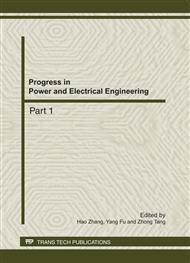[1]
National Development and Reform Commission, Ministry of Environmental Protection of the People's Republic of China, State Electricity Regulatory Commission, et al. Energy-saving generation dispatching trial procedures[S]. (2007)
Google Scholar
[2]
Xie Guohui. Study on Green Generation Dispatch Mode and Model [D]. Beijing: North China Electric Power University, (2010)
Google Scholar
[3]
Liu Peng. The full implementation of energy-saving power dispatching in five south provinces will reduce 11.61 million tons of emissions this year [EB/OL]. (2010-12-27). [2010-12-27]. http://www.ce.cn/cysc/ny/dl/201012/27/t20101227_20653241.shtml
Google Scholar
[4]
Li Yang, Ge Le, Lin Yi. Real-time power dispatch strategy considering energy saving and environmental protection [J]. Electric Power Automation Equipment, 29(3):42-45
Google Scholar
[5]
Xu Zhiyuan, Luo Xianjue, Niu Ta Thermal Unit Commitment Scheme Considering Electricity Market and Energy-saving Dispatch [J]. Automation of Electric Power Systems,33(22):14-17
Google Scholar
[6]
Zhou Ming, Lou Yarong. A Bi-Objective Weighted Fuzzy Generation Dispatching Model Considering Both Power Purchase Cost and Coal Consumption [J]. Power System Technology, 34(11):140-145
Google Scholar
[7]
Sun Jing, Yu Jilai. A Multi-objective Expectation Control Model and Its Solutions for Energy-saving Power Dispatch Problems [J]. Automation of Electric Power Systems, 34(11):23-27
Google Scholar
[8]
Wang Yao. Research on the Model of Dispatching Power Generation of Energy-saving [D]. Beijing: North China Electric Power University,(2008)
Google Scholar
[9]
Han Bin, Zhou Jing-yang, Cui Hui, et al. An Energy Conservation and Emission Reduction Based Power Generation Scheduling Model Leading in Factor of Penalty Price due to SO2 Emission and Its Practical Algorithm [J]. Power System Technology, 33(19):50-54
Google Scholar
[10]
Li Keyang. Research on Electric Energy Trade Model Considering Energy-saving Generation Dispatching [D]. Beijing: North China Electric Power University,(2008)
Google Scholar
[11]
Hu Jianjun, Li Jialong, Chen Huikun, et al. A Generation Dispatch Scheduling Model Based on Coal Consumption and Emission of Generation Unit[J]. Automation of Electric Power Systems,33(12):43-47
Google Scholar
[12]
Zhang Hui-qi, Chang Yong-ji, Tang Dayong, et al. A monthly electric energy plan making method of thermal power generation unit in energy-saving generation dispatching mode [J]. Power System Protection and Control,39(4):84-89
Google Scholar
[13]
Gao Ling. Incremental Transmission Losses and Environmental Costs [D]. Hunan: Hunan University ,(2010)
Google Scholar
[14]
Chen Haoyong, Zhang Senlin, Zhang Yao. Energy-Saving Power Generation Dispatching in Regional Electricity Market [J]. Power System Technology,32(24):16-22
Google Scholar
[15]
Zhu Weixin. Study on the Method of Units Sequencing Considering Energy Saving [D]. Beijing: North China Electric Power University,(2008)
Google Scholar
[16]
Fan Yuhong, Zhang Wei, Ye Yongsong, et al. Energy Conservation Generation Dispatching Mode in Regional Power Network Based on High-Low Matching of Coal Consumption Rates of Units [J]. Power System Technology,33(6):78-81
Google Scholar
[17]
State Electricity Regulatory Commission The Annual Report of Electric Power Supercisory (2009) [EB/OL].http://www.serc.gov.cn/zwgk/jggg/201005/W020100514491452266286.pdf 2010-05-14
Google Scholar
[18]
Zhagn Lizi, Xie Guohui1, Zhu Zhe., et al. Quasi Marketization Model of Energy-saving Generation Dispatching [J]. Automation of Electric Power Systems,33(8):29-31,43
Google Scholar
[19]
Shang Jincheng, Pang Bo, Wang Qing-min. Market Model and Algorithms for Economic Compensation Mechanism of Energy-Saving Generation Dispatch [J]. Power System Technology,34(4):62-68
Google Scholar
[20]
Shang Jincheng, Liu Zhidu. Coordination theory of energy-saving generation dispatch and its application [J]. Electric Power Automation Equipment, 29(6):109-114
Google Scholar
[21]
Shang Jincheng. Theoretical System and Technical Supporting System for Energy-saving and Emission-reducing of Electric Power System [J]. Automation of Electric Power Systems, 33(6):31-35
Google Scholar
[22]
Shang Jincheng. Generation Right Exchange Theory and Its Applications Based on Energy-saving and Emission-reducing Part One Generation Right Exchange Theory [J]. Automation of Electric Power Systems,33(12):46-52
Google Scholar
[23]
Shang Jincheng, He Yang. Generation Right Exchange Theory and Its Applications Based on Energy-saving and Emission-reducing Part Two Generation Right Exchange analysis and Applications [J]. Automation of Electric Power Systems,33(13):37-42
Google Scholar
[24]
Hu Jianjun, Hu Feixion. A Novel Compensation Mechanism of Remunerative Peak Load Regulation Under Energy-saving Dispatch Framework [J]. Automation of Electric Power Systems,33(10):16-18
Google Scholar
[25]
Zhang Sen-lin. Research on Pricing Mechanism of Bidding Price in Set With Energy Conservation Power Generation Dispatch [J]. Power System Technology,33(18):105-110
Google Scholar
[26]
Shang Jincheng, Zhang Liqing. Research and Application of Technologies in Energy-Saving, Emission-Reducing and Optimal Resource Allocation of Electric Power System [J]. Power System Technology,31(22):58-63
Google Scholar
[27]
Dong Xin-liang, Zhang Min, Zhang Qiu, et al. Discussion on Energy Saving Power Generation D ispatching System of Grid [J]. East China Electric Power,38(11):1707-1711
Google Scholar
[28]
Gu Yufang. Thinking about the combination of energy saving power dispatching and market mechanism[EB/OL]. http://www.serc.gov.cn/jgyj/ztbg/200907/W020090713507654326919.pdf 2009-07-13
Google Scholar
[29]
Zeng Ming, Shi Lianjun, Dong Jun, et al. Study on Issues Related to Energy-Saving Dispatching of Generation that Conforms to the Market Mechanism [J]. Electric Power Technologic Economics, 19(5):1-5
Google Scholar


